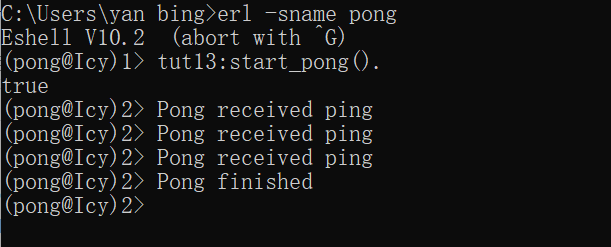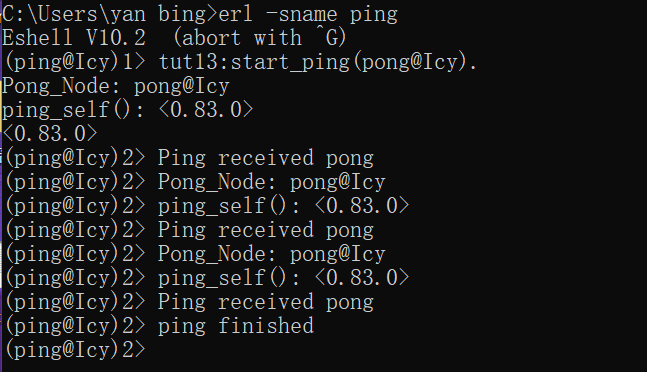Preface
Last time I have learned process and how to communicate between process - passing messages in Erlang concurrent programming.And practise a simple ping-pong example to achieve the sending and receiving of messages between two processes.
The purpose of this study is to see what other knowledge points in Erlang concurrent programming can achieve more abundant functions.
Text
Register Process
Why register process name:
In the last blog Erlang learning (5) - Concurrent Programming (1), in Ping-Pong example, we know processes which need to know each other’s identities are started independently of each other. But as communication with a person, you would like use his name instead of his ID. Erlang thus provides a mechanism for processes to be given names so that these names can be used as identities instead of pids. This is done by using the register BIF:
1
register(some_atom, Pid)
Modify Ping-Pong Example:
Using process name register, the code is more fresh and cool.
ping/2 now becomes ping/1 as the argument Pong_PID is not needed.
1
2
3
4
5
6
7
8
9
10
11
12
13
14
15
16
17
18
19
20
21
22
23
24
25
26
27
28
-module(tut11).
-export([start/0, ping/1, pong/0]).
ping(0) ->
pong ! finished,
io:format("ping finished~n", []);
ping(N) ->
pong ! {ping, self()},
receive
pong ->
io:format("Ping received pong~n", [])
end,
ping(N - 1).
pong() ->
receive
finished ->
io:format("Pong finished~n", []);
{ping, Ping_PID} ->
io:format("Pong received ping~n", []),
Ping_PID ! pong,
pong()
end.
start() ->
register(pong, spawn(tut11, pong, [])),
spawn(tut11, ping, [3]).
Test:

Distributed Programming
I want to experiment with distributed Erlang, but I only have one computer to work on, so I start two separate Erlang systems on the same computer but give them different names. Each Erlang system running on a computer is called an Erlang node.
1
$ erl -sname my_name
Modify Ping-Pong Example:
1
2
3
4
5
6
7
8
9
10
11
12
13
14
15
16
17
18
19
20
21
22
23
24
25
26
27
28
29
30
31
32
33
34
-module(tut13).
-export([start_ping/1, start_pong/0, ping/2, pong/0]).
ping(0, Pong_Node) ->
{pong, Pong_Node} ! finished,
io:format("ping finished~n", []);
ping(N, Pong_Node) ->
io:format("Pong_Node: ~w~n", [Pong_Node]),
io:format("ping_self(): ~w~n", [self()]),
{pong, Pong_Node} ! {ping, self()},
receive
pong ->
io:format("Ping received pong~n", [])
end,
ping(N - 1, Pong_Node).
pong() ->
receive
finished ->
io:format("Pong finished~n", []);
{ping, Ping_PID} ->
io:format("Pong received ping~n", []),
Ping_PID ! pong,
pong()
end.
start_pong() ->
register(pong, spawn(tut13, pong, [])).
start_ping(Pong_Node) ->
spawn(tut13, ping, [3, Pong_Node]).
Test:


Learning notes: From result, I understand there are 2 Erlang system:”ping” and “pong” on same Node “Icy”. Process ping on Erlang system ping@Icy can find process pong on Erlang system pong@Icy by argument Pong_Node.
But how process pong find process ping on different Erlang system just by Ping_PID <0.83.0>?
There is one explanation as this: Erlang pids contain information about where the process executes. So if you know the pid of a process, the “!” operator can be used to send it a message disregarding if the process is on the same node or on a different node.
So that means, the reason function start_ping/1 need argument Pong_Node, because process pong register name as pong, name pong does not include all information as pid itself?
Summary
This study is mainly to learn the basics of distributed programming in Erlang. There are some questions in the study, which are solved by testing and finding information. But I still need to continue practicing to understand the mechanism of concurrency and distribution.
Reference
http://www.erlang.org
http://erlang.org/doc/getting_started/conc_prog.html
-
Previous
Erlang learning (5) - Concurrent Programming (1) -
Next
Erlang learning (7) - Concurrent Programming (3)